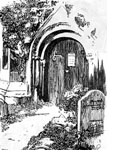
The Present State of the Catholic Church in England
ON CARDINAL HUME
George Basil Cardinal Hume, the Benedictine monk who served as Archbishop of Westminster from 1976-1999, was a man loved, respected, admired – even revered – by many people throughout the world. His particular qualities as an Englishman presented a more appealing face of Roman Catholicism to his fellow countrymen than a bishop from the Irish diaspora. His vocation as a Benedictine monk bore witness to the value of prayer and self-denial in an increasingly secular, agnostic, and hedonistic nation. With good reason many now think of him as a saint.
A half dozen years after his death, however, the statute of limitations imposed by good taste (de mortuis nil nihil nisi bonum) can be said to have run out and it is legitimate to ask whether any revisions can or should be made to the late Cardinal’s reputation. Is there scope for an advocatus diaboli? Should any failings he might have had be forgotten — or might uncovering them help us to understand and perhaps ameliorate the present state of the Roman Catholic Church in England?
“Fr. Basil” was a housemaster (though not my housemaster) when I was at Ampleforth as a boy. I came across him on odd occasions in adult life and he showed me great kindness, inviting me to tea at the Archbishop’s house: He was amused, I think, rather than outraged (as were some of the other monks of Ampleforth) by the depiction of a Benedictine school in my novel Monk Dawson. Later, however, my affection was combined with a certain dismay. There were, it seemed to me, important areas where he failed to sift the good from the bad in the legacy of Vatican II. As a result, by the time of his death, the perception of the Roman Catholic Church among non-Catholics in Britain had greatly improved, but her actual condition had grievously declined.
The seeds of this paradox were there from the start. The way in which Basil Hume had, as Abbot of Ampleforth, dealt with the turbulence that had followed Vatican II impressed those choosing a successor to Cardinal Heenan. Cynics would later say that Hume’s success at Ampleforth came not from strong leadership but amiable procrastination. But his Englishness had a further appeal: hopes for a reunion of the Church of Rome and the Church of England ran high at the time, and in Basil Hume there was surely a man who could be equally credible as Archbishop of Westminster and Canterbury: who knows, it was thought, perhaps in his lifetime the two might become one?
You May Also Enjoy
How dissent became 'institutionalized' in the Church in America
One of the prime characteristics of the Church in our time is an almost complete absence of discipline, even in dioceses led by good bishops.
One function of the Catholic bishop is to insist upon the doctrinal integrity of the whole of the Church's teaching. Today's bishops have too often forgotten this.

